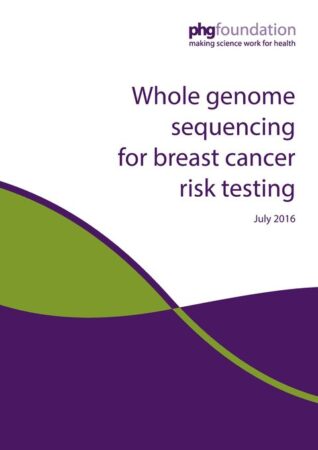Home Publications Reports Whole genome sequencing for breast cancer risk testing
Whole genome sequencing for breast cancer risk testing
The PHG Foundation report Whole Genome Sequencing for breast cancer examines the impact of routine testing for inherited / heritable conditions using whole genome sequencing where these conditions are not part of the primary purpose of testing. The report uses the example of inherited breast cancer, and its findings are relevant across a range of cancers.
This paper demonstrates the type of process that should be undertaken when considering likely test and health outcomes that may arise when using WGS in unselected populations, using the example of inherited breast cancer variants. The aim of detecting such genetic variants is to quantify the absolute risk of disease conferred by the variant for an individual. This will allow valid judgements to be made about the risks and benefits of clinical interventions for the patient and family.
Conclusions
At present these many uncertainties will impact on the clinical utility of actively seeking secondary findings using WGS, even for relatively well-characterised genes such as BRCA1 and BRCA2. These can be addressed by appropriately planned and resourced evaluation of developing practice and research, including detailed consideration of the health economic implications. Applying the process demonstrated in this paper to other gene-disease combinations, though, is likely to highlight further gaps in knowledge and understanding around clinical validity and utility, which should be considered before offering routine testing of genes for secondary purposes in unselected populations.
By Charlotte Warren-Gash, Mark Kroese, Hilary Burton, Paul Pharoah

